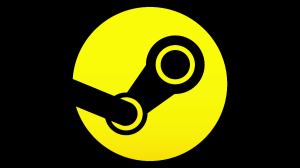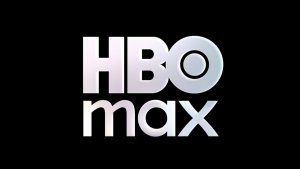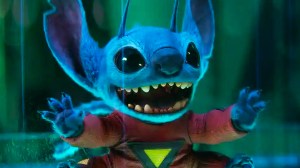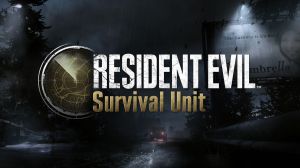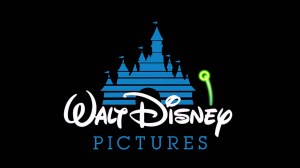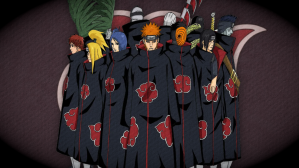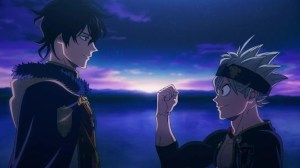
It’s been just over thirty years since the release of Booster Gold #1, the first appearance of the Corporate Crusader and the start of a heroic legacy that now spans two monthly series, dozens of appearances as part of the Justice League and, reportedly, a movie in development.
Videos by ComicBook.com
Booster Gold was created by writer/artist Dan Jurgens, who has written most of Booster’s solo issues and drawn more than half. It was he who pitched the idea to DC Comics at a convention in the ’80s, and he who established a new status quo for the character during DC’s recent Convergence crossover event.
Jurgens joined ComicBook.com to talk about the thirtieth anniversary of Booster Gold’s first appearance, what’s come since and his hopes for the future of the character.
You started your career at DC in the ’80s. What was the environment like at that time, that ushered in the set of circumstances where you could bring Booster Gold to the page?
DC in the ’80s was a very interesting place and a lot of it was because it was a place where you could have experimentation. I think there was certainly an openness to trying some different kinds of things. When you look at it, whether it was Frank Miller doing Ronin or The Dark Knight Returns, or obviously a couple of years later you had Watchmen, there was this idea that it was a place where you could try different things, even in terms of doing more of a traditional monthly superhero type of book.
The idea was that you could try something different. In fact, that’s what they were actively looking for. They wanted something that was very different and a lot of that was guys like Dick Giordano, certainly Paul Levitz, and Jenette Kahn played a big role in that.
As a creator, it was a very fun place to be. It was a time, as I said, where they were open to different ideas.

What was it that precipitated the creation of Booster Gold? You had created characters The Warlord and Sun-Devils and things like that, but this was the first new property that was all yours.
Right. And a lot of it was based on the idea that I knew obviously that they wanted something that just felt al little different. I think the interesting thing is, even when I talk about some of the things that were working at DC in terms of collaboration, fi you look at the more traditional Batman and Superman monthlies…well, I used the word “tradition,” and I think that’s what they were. I think Dick wanted something a little bit more unconventional, and around that time, he also had Blue Devil, which was something that fit that profile for them.
For me, I always had this idea that there would be a way to match super heroics up with this emerging celebrity culture and the idea of celebrity endorsements and everything else. Obviously it had been around before but it was getting bigger at that time.
And I had seen the Olympics in ’84 and them talking about an athlete who was signing an endorsement contract and that sort of thing. It all seemed to sort of fit together that way for me. It was a theme I liked and it was something that I wanted to pursue.
I remember hearing that DC was worried about a young, untested creator in a writer/artist role. Was that why Sun-Devils had a co-writer? And was there any pushback in terms of Booster Gold on that level?
Oh no, no, no. When I was writing Sun-Devils, it did not have a co-writer. I think what it was is that Gerry Conway was writer and editor and I think he wrote the first six issues. I think he wrote #7 and Paul Kupperberg dialogued that, and I started writing it afterwards. Once I started writing it, there was no co-writer. Obviously Gerry remained as editor and exercised proper influence that way.
So there was no pushback in terms of giving you the keys to your own car with Booster?
Well, yeah. I think there was a little bit of that, and pushback would not be the right word. I think maybe…hesitancy?
Fortunately, I have to say that I think Dick in particular believed in me and some of the things I could do and was willing to roll the dice and take a shot. I think he was very true to creators that way in general; it wasn’t just me. That’s the way I think he as a Managing Editor at that time, managed DC. So I think they were like “Let’s see what you can do.”
We certainly went back and forth on some things and one of the biggest things was, right away there became this idea in the hallway that Booster was a hero for hire. And I said, “No, he’s not a hero for hire. He’s not that. He’s the guy who, after he saves everybody from a burning building, walks up to the nearest commercial entity he can find and says, “Hey, how would you like to sponsor me?” That’s what he is; he was in it for the endorsement idea.
How did actually pitching Booster go? Did you pitch it to Paul, or to Dick, or…?
Oh, it was Dick. I actually was at a convention in Dallas and I had told Dick, “I have this idea, and can I get five minutes with you?” And again, at that time, I’d already been there a couple of years, I’d been writing Sun-Devils, they had some faith in me, and seemed to like my work. So we sat down to brunch one day and I laid out this idea for Booster Gold, and here’s why he was different. For me, that was the big one, was explaining, “I have this idea for this character. Here’s why he’s different from everything else you have.” And in essence, Dick bought it on the spot. He really said, “I like this, I can see where this fits, give me a paragraph. Give me something in writing and art.”
So I went home, I wrote up a one-page thing, said “Here it is; here’s Booster Gold,” here’s how it works, here’s what the series is, had the first sketches of the character and that was that. We were off and running.

One of the things that struck me as I flipped back through Booster Gold Volume 1: Saving Reagan in his first appearance, do you think that would be a harder sell in today’s market? It seems like that’s less fashionable now, using the real President, unless it’s for a novelty thing like Spider-Man‘s Obama appearances and then it reverts to Marvel President later on.
You know, probably. It does seem that we have changed that way and frankly, I think it’s always a little better if both Marvel and DC Universes have their own President. That way you can make him whatever you want to be, sort of like when DC had Luthor. That’s one of the things that we kind of go back and forth on.
I always thought Reagan, the free market champion, was a great match for Booster.
Yeah. I think there’s an element of truth to that. I think what’s fun about it is, it does help put these characters in a particular time and generally I think that’s helpful.
When I was 14 and the books were out, I was very conservative and I didn’t like Bill Clinton — so for a very long time, I had Bill Clinton shaking hands with the Cyborg Superman on my wall.
[Laughs] And there’s a bit of a counterpoint. If you think about when we did The Death of Superman, having Clinton there to eulogize him was helpful and effective. I think it added an air of reality to the story that we were looking for and it was also cool just because it became such a big thing in culture generally, so there is that.
It’s like anything, you get the good and the bad. Certainly, I thought, we probably went a little too far when I was doing Action Comics Weekly and Nancy Reagan was revealed to be a Manhunter. Even I looked at it and said, “Really? Is this what we’ve come to?” [Laughs]
The problem for me with that — leaving politics aside and whether or not you like the Reagans — the whole idea of having the real President is to ground your story in reality. And you totally blow that out of the water if the First Lady is a killer robot from space. [Laughs]
Exactly right.

Booster has endured more than 95% of the characters created in the last thirty years. Is it nice to finally see the originals coming available digitally? The only reprints we had up to this point was the black-and-white Showcase Presents edition, which didn’t really serve the Rainbow Raider story that much.
[Laughs] Well, it is and I think for me, in a bit of a different way. To step back a little bit, at that time, even the concept that this stuff would be gathered up in a book was really not practical. It was pretty much unknown. You had those small digests and maybe something would show up like that, but the idea that it ever would be collected was something that we couldn’t fathom very much at those times. There was talk of it, like maybe DC might gather two collected editions a year, something like that.
Digital was so unimaginable that on a personal level I just find it cool to go back and have it myself that way, just because it was — to go back and look at it — something you couldn’t even conceive of back then. And I think it’s sort of appropriate for a character from the future anyway.
Is there anything you would have done differently in that first series?
It’s funny. The biggest discussion at the time perhaps was, when we started off with issue #1, does the world know who Booster is, or are we getting him at Day One? In other words, is he already partway into being the character he’s going to be, so we can play up those differences? We actually had a lot of discussions about that and my feeling at the time was to get him halfway into it. If we start from Day One, and we get those first struggles, that we can’t immediately show that which makes him different.
I’m not sure that was the right way to go, I’m not sure it was the wrong way to go, but I think there would have been ways to do it better, and if I had it to do all over again, I think that humor would have still been part of the book but I would have gotten more drama into it with heavier-duty villains, stuff like that. And some of the later stuff we saw, where Broderick came from the future looking for him and stuff like that, I think we should have had him in #1. Let’s introduce his own personal adversary from Day One, get him in issue #1 or #2 so he’s there and we can already start to set up that kind of confrontation.
So I don’t know if it would be grand, wholesale changes, just things like that.
What went into the decision to not give readers his backstory at first? It was a while before we found out for sure what his origin was.
That was always designed to be something that goes right to that conversation we were just having, which is “Why give all the answers right away?” Let’s play it out, let’s make it kind of a mystery. Early on, we had him saying things like “I know what’s going to happen here.” Well, how did he know?
And that was designed to play up the mystery of the character somewhat, which is still I think an effective way to do it.
That’s a device that you use in your writing in general, I think.
Yeah, I think so. I’m one who tends to find that more compelling and some of it is, because in a lot of ways that’s what I responded to as a reader. I like the mystery of characters and being given the opportunity to try and figure it out myself. And we’re talking about me as a 13-year-old at this point, if I then figured it out, it’s like “Yeah, I figured it out!” And if I didn’t and I was surprised, it was like “Wow! I didn’t see that coming!” And I still think that’s an important part of what any storyteller does, whether it’s comics, movies, TV or anything.
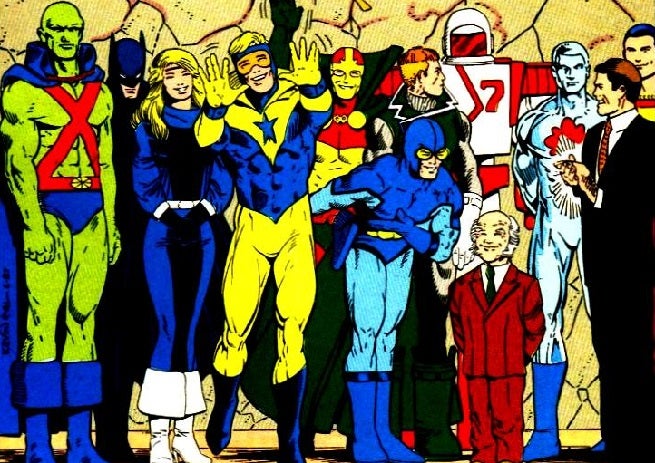
Moving past the first volume, once that was over, how did you feel about Booster’s role in the Justice League International and how when Marc and Keith came along, he became a different character?
I think it’s important to note that he showed up in Justice League #4, so he was in the League before the Booster Gold title itself came to an end. I think it’s important to recognize that because already we’d gotten to the point where Keith and I were having conversations about stuff and how it might go. I think there was about four months’ overlap and I remember talking to Keith about it at that time.
The way I always looked at it was this: I thought it was positive that the character would remain out there somehow but I think all of us at DC sort of looked at the Justice League book as an Earth-Giffen type of project and knew that at the end of the day, some things might stick and some things might not.
I think what surprised all of us is where he got to with Blue Beetle and all, because that just kind of happened. That just kind of developed on its own.
I never had a problem with it. As I said, it’s good that he remained out there and I think we were all able to look at it and say, “That’s what this book is. It’s sort of side-stepping a lot of the other things that are going on right now.
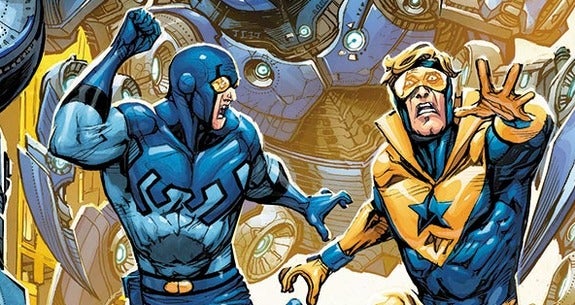
And of course, in hindsight, DC has sort of canonized that idea of Earth-Giffen as they’ve given Marc and Keith their own playground in Justice League 3001 now.
Yeah. Which I think is a good thing. Keith, what he does, the way he works, what he brings to these characters, I think that’s a great place for them to be. I mean that in every possible complimentary way. Seriously, what writer wouldn’t want “Here’s my version of the DC Earth?” That’s as good as it gets.
When they left Justice League and then you came on, you were there for like six months before Doomsday trashed Booster’s costume that began this long odyssey of getting him back to a status quo. Was there a master plan when you did that, or what was the thinking?
That actually came out of a conversation between Mike Carlin and me, where he said “Let’s give Booster a little bit of a different look,” just to dust it up a little bit. I said sure, that sounds like a great idea. So we started to pursue that at the time. never in my wildest dreams did I imagine he would end up in that awful, robotic sort of mechanical, big shoulder pad armor. It’s like “Oh, my God,” but that’s kind of where that originally came from.
Frankly, it’s also worth noting that virtually everyone had their costumes shredded by Doomsday. It wasn’t just Booster.
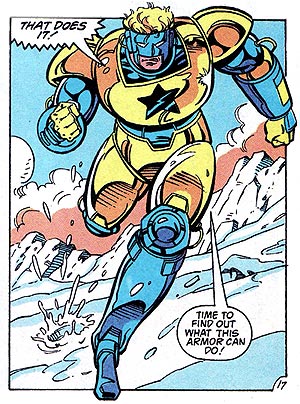
Well, you kind of touched on this, but what did you think of the Iron Booster era?
The less said, the better. [Laughs]
I mean, that had all the sins of the ’90s fully on display.
When you create a character that makes a big impression in a fairly short time, what’s it like during that middle period? There was a stretch of time where Booster’s profile in the DC Universe was much lower. Did you ever have kind of a worry as a creator that he might fall off the map?
I don’t know if worry is quite right. The better way to say it is, I’d look at it and say that somebody’s missing an opportunity here because there are plenty of things that I think could be done with the character right now, and he’s on the shelf.
That lined up roughly with a period when you were doing a lot of work at Marvel.
Yeah.
In the post-52 world, you’ve been key to charting Booster’s course again but prior to Infinite Crisis and everything, did you know where the character was headed?
Yes and no. The guys who were doing 52 are pretty much on record as having said that the plan originally was that Booster was going to die. I know that I’d gotten a call where that was explained to me, and I said, “Okay.” I always think, not that it was shortsighted because we all know what death means in comics and in a way it’s just another transitional step.
And then they later called me up and said “By the way, we changed our minds, and that’s not going to happen.”
And I thought that was smart because, again, I thought that the character had value and there should be a way to do a Booster Gold title and get him back out there again.

When that eventually happened, were you brought on board immediately with Volume 2 or were you first told just that it was going to happen?
No, I had already known that he was going to be alive. I knew that they were talking about various potential spinoffs from 52, and then yeah, they gave me a call and said “One of those spinoffs is going to be Booster and we’d like you to draw it. So that all came together at once.
Obviously, Geoff Johns has a really keen ability to key on what works in a character. With Booster, I feel like he picked up on some stuff that either was entirely a creation of his or that was in Volume One but in small, subtle ways. What was it like to pick up after he left, taking a character you had so much ownership of and making sure to integrate somebody else’s take so strongly?
It wasn’t odd at all because I felt like I knew the character so well.
To step back a little bit, what Geoff had done — and I think this was incredibly smart of him — he went back to two things about the character that made him fairly unique. One is that he’s a time-traveler, so he said, “Let’s make this a cornerstone, and something we can call the foundation of the series.”
The other one was, he recognized that Booster had his faults and that he got his stuff in the first place by being a different type of person, who had gone down the wrong road and was trying to make up for it.
To me that’s one of the most interesting things about Booster because we don’t have that many characters like that in comics. Usually they do what they do because their parents were killed or their planet died or whatever. For Booster, it really was “I screwed up, this is how I can make good.” Geoff recognized that and made that a core part of the book, along with this idea of family.
So when you look at how it all worked out, a lot of it was that you take the idea of Rip Hunter, who had been a fairly strong player in Volume One, brought him back into it, brought [Booster’s] sister into it and said, “Let’s focus on that.” So in a way, when I then picked up after both Geoff Johns and Jeff Katz left, it was a way for me to kind of go back to the character’s roots at that point. That was easy to me!
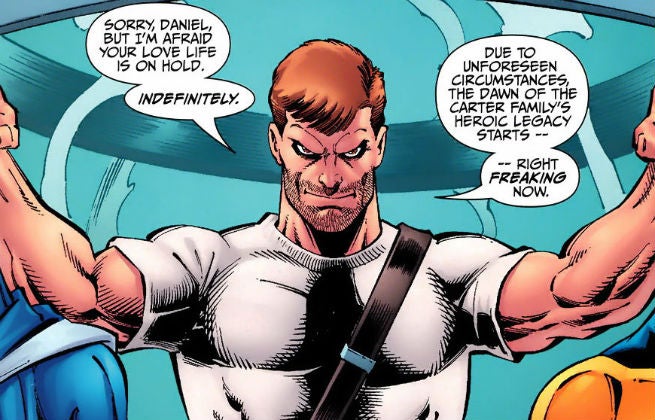
How did Rip come to be involved in the way he was? You used him a fair amount in the Linear Men stuff in your Superman run, but at that point, he was the cyborg, white-haired version. What was the idea of not only bringing him back into the picture but bringing him back in the classic form? Did you have an idea of how he got that way?
I think some of that, at that point, was just what you do in some cases. When you pick up a character who’s sort of been on the shelf a long time, there’s this tendency in comics to put a little bit of a different spin on him.
I think that what Geoff Johns had given Rip Hunter is that he gave him more of a mission, which I really liked, which was, “Booster, this is what we’re going to do, this is how we do it,” and Rip suddenly instead of just being a guy who got into a time bubble and went joyriding through time to have adventures, was more like the authority on time, which is a little bit where I had taken him as part of his role in the Linear Men on Superman.
When I was on Booster Gold Volume One, we had only seen Rip Hunter a couple of times in the previous 15-20 years. So I picked up on that and I brought him back into the DCU. When I brought him into the Linear Men a little bit later, he became a little bit more of a time travel expert rather than just an adventurer, and then Geoff I think took that to the next level as part of the Booster Gold Volume 2 series.

Now, I know you don’t want to give up the two big mysteries that drove so much of Volume 2, which is the identities of Rip Hunter’s mother and of the Black Beetle, because you may be able to tell a version of those stories at some point. When you come to something like Convergence, did that kind of firm your resolve that these stories never really end in the DC Universe?
That’s how I look at it. I think that in all honesty, I’ve been around long enough that I’ve seen edicts that say “Universes die! Universes are born! We won’t have any more time travel! Oh yes we can!” And I just think characters live on in a way and certainly with Convergence, what we did is we sort of tweaked Booster’s origin insofar as the New 52 Booster Gold, and we also showed what happened to Booster Gold from the pre-Flashpoint universe, so it all kind of bundled together in a way. I always look at it and say there’s going to be a chance one day, some day, somehow, to give those answers. And that doesn’t mean they would be in the same story, but things live on.
If Booster were to happen today, I think there would be a lot of temptation to toggle him back and forth of being a quote-unquote bad guy. It seems that’s done a lot with the characters who have done something wrong and are making up for it, is that they backslide. Early on did you have to explain to people that’s not who Booster is?
Obviously, there were. And that’s why to me, it never would have been logical to go back or do that with this particular character. I think that his story is one of, I made my mistakes, I’m trying to get past that. In part because with what Booster did, he was never evil anyway. He made mistakes. And we even said that the reason he went out and gambled as a football player and threw games is that his family needed money. Even in that, there was sort of a nobility, he just did it the wrong way. He never would have gone down that road.
I think the funny thing is that if Booster were coming out today in the first time in the world of social media and celebrity culture and everything we have right now…I think Booster was ahead of his time, and I think there would be tremendously compelling ways to do a Booster Gold series now that would tap into that kind of stuff.


